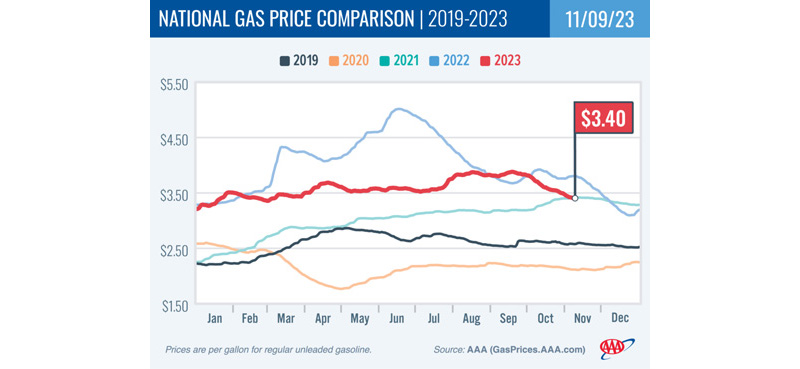Decline at the pump may gain speed after recent drops in the price of oil
Washington, D.C.—The national average for a gallon of gas dropped four cents since last week to $3.40. However, the steady, if slow, decline may gain speed after recent drops in the price of oil. Parked in the mid-$80s per barrel a week ago, oil is now hovering around the mid-$70s. Since it is the main ingredient in gasoline, less expensive oil usually leads to falling gas prices.
“We still need to cast a wary eye on global events, which may roil the oil market and spike prices,” said Andrew Gross, AAA spokesperson. “But domestic gas prices are amid their usual seasonal swoon. Pump prices have fallen or remained flat every day since September 19.”
For this week, the Energy Information Administration (EIA) delayed its scheduled data releases, including its weekly estimates of gasoline supply and demand, to complete a planned systems upgrade. The EIA will resume its regular publishing schedule next week. However, given how the national average has declined this week, gas demand has likely remained flat or dipped, contributing to lower pump prices and falling oil prices.
Today’s national average of $3.40 is 30 cents less than a month ago and 40 cents less than a year ago.
Quick Stats
- Since last Thursday, these 10 states have seen the largest decreases in their averages: Montana (−17 cents), North Dakota (−15 cents), Colorado (−14 cents), South Dakota (−12 cents), Wyoming (−11 cents), Oklahoma (−11 cents), Arizona (−11 cents), Utah (−11 cents), New Mexico (−11 cents) and Kansas (−11 cents).
- The nation’s top 10 least expensive markets: Texas ($2.86), Georgia ($2.88), Mississippi ($2.88), South Carolina ($2.95), Louisiana ($2.96), Alabama ($2.98), Arkansas ($2.98), Oklahoma ($2.98), Tennessee ($2.99) and Delaware ($3.02).
Oil Market Dynamics
At the close of Wednesday’s formal trading session, WTI decreased by $2.04 to settle at $75.33. Oil prices fell this week due to a stronger dollar and reduced market concerns that the conflict in the Middle East will escalate, which could lead to a reduction in regional oil production and higher prices.








Comments are closed.